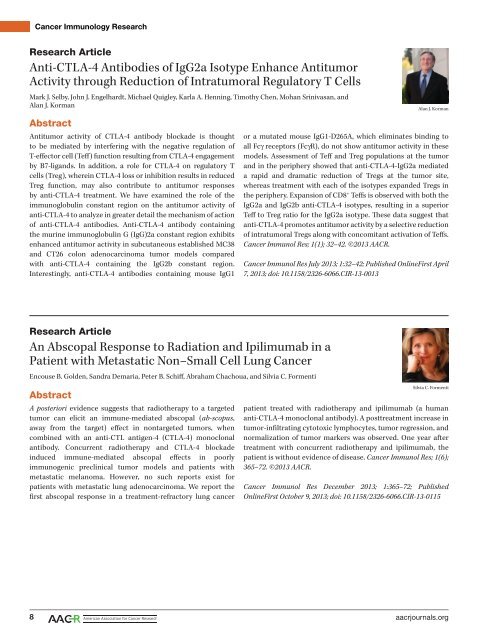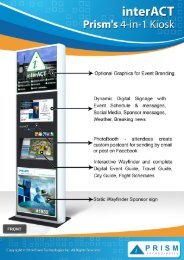Best of AACR Journals
You also want an ePaper? Increase the reach of your titles
YUMPU automatically turns print PDFs into web optimized ePapers that Google loves.
Cancer Immunology Research<br />
Research Article<br />
Anti-CTLA-4 Antibodies <strong>of</strong> IgG2a Isotype Enhance Antitumor<br />
Activity through Reduction <strong>of</strong> Intratumoral Regulatory T Cells<br />
Mark J. Selby, John J. Engelhardt, Michael Quigley, Karla A. Henning, Timothy Chen, Mohan Srinivasan, and<br />
Alan J. Korman<br />
Alan J. Korman<br />
Abstract<br />
Antitumor activity <strong>of</strong> CTLA-4 antibody blockade is thought<br />
to be mediated by interfering with the negative regulation <strong>of</strong><br />
T-effector cell (Teff) function resulting from CTLA-4 engagement<br />
by B7-ligands. In addition, a role for CTLA-4 on regulatory T<br />
cells (Treg), wherein CTLA-4 loss or inhibition results in reduced<br />
Treg function, may also contribute to antitumor responses<br />
by anti-CTLA-4 treatment. We have examined the role <strong>of</strong> the<br />
immunoglobulin constant region on the antitumor activity <strong>of</strong><br />
anti-CTLA-4 to analyze in greater detail the mechanism <strong>of</strong> action<br />
<strong>of</strong> anti-CTLA-4 antibodies. Anti-CTLA-4 antibody containing<br />
the murine immunoglobulin G (IgG)2a constant region exhibits<br />
enhanced antitumor activity in subcutaneous established MC38<br />
and CT26 colon adenocarcinoma tumor models compared<br />
with anti-CTLA-4 containing the IgG2b constant region.<br />
Interestingly, anti-CTLA-4 antibodies containing mouse IgG1<br />
or a mutated mouse IgG1-D265A, which eliminates binding to<br />
all Fcγ receptors (FcγR), do not show antitumor activity in these<br />
models. Assessment <strong>of</strong> Teff and Treg populations at the tumor<br />
and in the periphery showed that anti-CTLA-4-IgG2a mediated<br />
a rapid and dramatic reduction <strong>of</strong> Tregs at the tumor site,<br />
whereas treatment with each <strong>of</strong> the isotypes expanded Tregs in<br />
the periphery. Expansion <strong>of</strong> CD8 + Teffs is observed with both the<br />
IgG2a and IgG2b anti-CTLA-4 isotypes, resulting in a superior<br />
Teff to Treg ratio for the IgG2a isotype. These data suggest that<br />
anti-CTLA-4 promotes antitumor activity by a selective reduction<br />
<strong>of</strong> intratumoral Tregs along with concomitant activation <strong>of</strong> Teffs.<br />
Cancer Immunol Res; 1(1); 32–42. ©2013 <strong>AACR</strong>.<br />
Cancer Immunol Res July 2013; 1:32–42; Published OnlineFirst April<br />
7, 2013; doi: 10.1158/2326-6066.CIR-13-0013<br />
Research Article<br />
An Abscopal Response to Radiation and Ipilimumab in a<br />
Patient with Metastatic Non–Small Cell Lung Cancer<br />
Encouse B. Golden, Sandra Demaria, Peter B. Schiff, Abraham Chachoua, and Silvia C. Formenti<br />
Abstract<br />
A posteriori evidence suggests that radiotherapy to a targeted<br />
tumor can elicit an immune-mediated abscopal (ab-scopus,<br />
away from the target) effect in nontargeted tumors, when<br />
combined with an anti-CTL antigen-4 (CTLA-4) monoclonal<br />
antibody. Concurrent radiotherapy and CTLA-4 blockade<br />
induced immune-mediated abscopal effects in poorly<br />
immunogenic preclinical tumor models and patients with<br />
metastatic melanoma. However, no such reports exist for<br />
patients with metastatic lung adenocarcinoma. We report the<br />
first abscopal response in a treatment-refractory lung cancer<br />
Silvia C. Formenti<br />
patient treated with radiotherapy and ipilimumab (a human<br />
anti-CTLA-4 monoclonal antibody). A posttreatment increase in<br />
tumor-infiltrating cytotoxic lymphocytes, tumor regression, and<br />
normalization <strong>of</strong> tumor markers was observed. One year after<br />
treatment with concurrent radiotherapy and ipilimumab, the<br />
patient is without evidence <strong>of</strong> disease. Cancer Immunol Res; 1(6);<br />
365–72. ©2013 <strong>AACR</strong>.<br />
Cancer Immunol Res December 2013; 1:365–72; Published<br />
OnlineFirst October 9, 2013; doi: 10.1158/2326-6066.CIR-13-0115<br />
8<br />
aacrjournals.org



